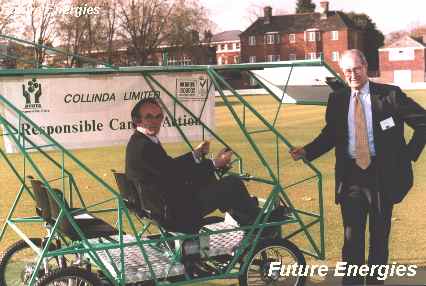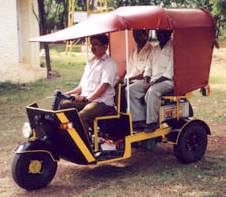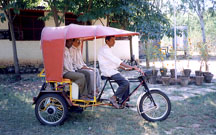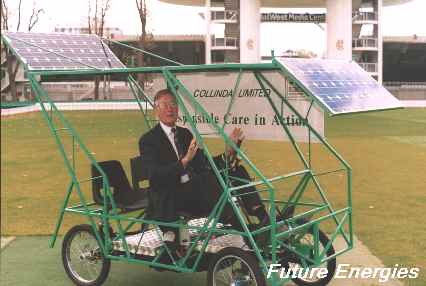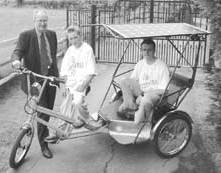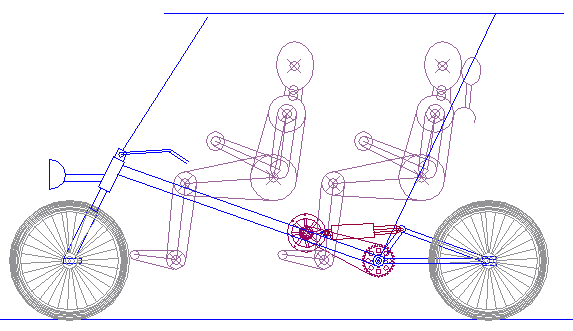|
SOLAR POWERED RICKSHAW - BLUEBIRD MOTORS
|
||||||
|
INTRODUCTION
Most of the cities in developing countries are highly polluted. The main reasons are the air and noise pollution caused by transport vehicles, especially petrol-powered two and three wheelers. For example, in India there are close to 18 million petrol powered two wheelers and about 1.5 million petrol and diesel powered three wheelers and their population is growing at a healthy rate of about 15% per annum.
Besides being a major hazard to people’s health, these machines are guzzling huge amounts of petrol and diesel for which any country has to pay dearly in foreign exchange outflow. In fact it is a common sight in developing countries as much as in the City of London, Paris, Rome or Los Angeles, that during traffic jams in congested areas these vehicles produce tremendous pollution.
In the major cities of India there are thousands of petrol and diesel powered three-wheelers called auto-rickshaws. They are some of the most polluting vehicles on Indian roads and the huge number of them is a major global pollution issue.
Lightweight Solar Rickshaw by Collinda Ltd.
These vehicles usually run on 2 stroke engines which are more polluting than the regular 4 stroke engine. Data collected reveals that in traffic conditions prevalent in most inner city areas, these auto-rickshaws run only at 15-20 km/hr speed thereby producing even more pollution since they are designed to run efficiently at 40-45 km/hr. The pollution is further compounded by the fact that they continuously have to run in stop/start mode.
The data also shows that on average these auto-rickshaws travel about 50-60 km. a day. Based upon this data it was felt that a solar powered (electric) rickshaw designed to run 60-80 km/charge and with speeds of 25-30 km/hr will be an excellent substitute for these auto-rickshaws. In a fair weather country like India, a silent and non polluting electric rickshaw with the above attributes could be a major step forward in race to halt global warming.
Bluebird Systems Ltd are part funding the research and build of a lightweight solar powered rickshaw which has the ability to replace the millions of fossil and pedal rickshaws that operate throughout Asia. Demand is anticipated to be 10,000 units per annum by 2010. Each auto rickshaw replacement has the potential to save 10 tons of carbon dioxide emissions every year. If your company might be interested in helping to fund (or sponsor) this genuinely environmental project, BER Ltd would like to hear from you urgently.
The Bluebird solar powered Rickshaw solves a number of issues relating to battery charging and replacement battery costs - quite simply there are no such issues with a solar powered car. The vehicle will feature all wheel independent suspension and disc brakes.
ELECSHA EXPERIMENT
In major cities of India there are petrol and diesel powered three wheelers called autorickshaws. They are some of the most polluting vehicles on Indian roads. Consequently an electric autorickshaw which is completely silent and non-polluting has been designed, built and tested. It is called ELECSHA and up to September 2002 had logged more than 6000 km in a trial run.
Mk II Elecsha
Attributes of ELECSHA:
ELECSHA plan to introduce these rickshaws in the cities of Lucknow and Pune where maximum number of cycle rickshaws and autorickshaws respectively, ply the country. The comparison of electric rickshaws and autorickshaws can only take place once ELECSHA vehicles begin work in real conditions. However based upon existing data a simple economic analysis can be done.
a) Driver will be paid Rs. 75/day. Presently
the petrol autorickshaws charge Rs. 4.50/km and hence even
with the reduced fare for ELECSHA the owner can make a good
profit. This is because of the low running cost of ELECSHA.
Thus it seems that for both rickshaw puller and owner it is
economically viable to ply these rickshaws. OTHER ISSUES
The electricity to power these batteries can come from any renewable power plants like biomass, solar, wind etc. In fact it can be envisaged to have battery-charging stations powered by PV units. Hence these rickshaws can truly be called as renewable energy transport system. To convert all existing 1 million rickshaws in India into electric rickshaws will require only one 600 MW power plant to run them.
It is also instructive to look at the energy efficiency of electric rickshaw vis a vis petrol powered autorickshaws. From power-plant to traction-energy point of view ELECSHA consumes 110 Whr/passenger-km as compared to 175 Whr/passenger-km consumed by petrol autorickshaws. In this calculation the following assumption were used :
a) ELECSHA : i) Electric power plant efficiency including T & D losses = 0.255 ii) Charging / discharging efficiency of batteries = 0.64 iii) It takes 2 passenger 80 km per charge Petrol autorickshaw : i) Average mileage = 25 km / l of petrol ii) Calorific value of petrol 8.74 kWh / l. Thus ELECSHA uses 40% less energy than petrol autorickshaw. Besides being environmentally friendly ELECSHA is also very efficient energy wise. It is considered that small systems like rickshaws are most suited for electric vehicle development. This is because the present level of battery technology precludes large power output from light weight batteries. Hence, the electric rickshaw can be easily designed with the existing motor and battery technology.
2. Policy Issues : There is a need for Government intervention with a policy to permit only improved cycle rickshaws and electric rickshaws in congested areas of inner cities.
This may also help reduce pollution, provide a clean sustainable transport system and provide employment. Already, the Courts have banned three wheeled diesel tempos from certain parts of Lucknow. Electric and improved rickshaws can provide an attractive alternative to help this order, provided the shortcomings above are addressed urgently.
It would also be an advantage if the Government could enact legislation such that banks might provide lower interest loans to the rickshaw owners. Since this is a renewable energy system, a California style grant is also an option to consider. or indeed, carbon credits could be offered on the open market to offset EV purchases.
Besides creating a non-polluting transport system in India, electric rickshaws will also provide dignity to rickshaw pullers. Presently rickshaw pullers are treated as belonging to the lowest rung of the society. Many rickshaw pullers have said that a motorized rickshaw would give them dignity. It is felt that the police and other road users in general treat motorized road users with more respect. Besides giving dignity, electric rickshaws can also provide extra income to the rickshaw puller since he can ply his rickshaw to greater distances in one day.
FUTURE ENERGIES UK DEVELOPER & COLLINDA LIMITED SPONSORSHIP
During 2000 another British company, Collinda Limited, developed the solar powered rickshaw seen below. Eventually, this project won the Eurosolar transport award in 2000 and the vehicle appeared on the BBC programme Tomorrows World. To help create the demand and continue with research Collinda were to cooperate with sponsors Royal Rajasthan, for a Solar Rally, of which we have not heard any update as we write this article.
Sunday, January 05, 2003
During testing between and Udaipur in Rajasthan the Collinda vehicle was filmed by 5 Asian TV channels and an interview with the Rajasthan Minister of Energy was shown to an audience estimated between 10m and 30m people. India is ready for such a vehicle which has acceleration much better than a cycle rickshaw and equivalent to an auto rickshaw. Top speed recorded was 40 kph and at the normal road speed in cities of 20 kph, 400 Watts was needed which was far less than the power from the BP solar panels of 850 Watts.
On
the morning of the 29th March 2001 the Moss family based in
Leatherhead UK packed their bags and prepared for the journey of
a lifetime across India in a remarkable solar powered car (as
seen on the BBC Tomorrow’s World programme). The solar team is
made of 7 people who wish to prove that solar energy can be a
viable solution for a non-polluting form of transport so badly
needed in India at this time. The team hoped to make the full
crossing with the car from Delhi to Udipaur only using the suns
energy.
This experiment across India will not only suggest that solar is a viable source of energy for transport but will also prove that solar power can be a reliable source of electricity for communication and computer equipment in the most diverse and remote terrains. “So far we have already had some success. As some of you may know we recently won the Uk Euro Solar prize. Michael Meacher, (Minster of the Environment ) and Charles Secrett, (Director of Friends of the Earth) and professor Susan Roath (professor of solar architecture) sat in the vehicle as you can see from the pictures."
“There is a desperate need to reduce carbon dioxide emissions. As a family we have shown that emissions and pollution in boats can be greatly reduced by powering boats with solar power. We have decided after the solar boat success that we would try to build a commercial solar car. Follow our journey here on FutureEnergies.com, the official website for the Collinda Indian Solar Rickshaw Journey. See our day to day diary and pictures of our trip.”
Solar Taxi Team:
James Moss Malcolm Moss MD Collinda Limited Buster Keen Gulsham Kapur Communications Team
The patrons include:
COLLINDA LIMITED
An established distributor of speciality chemicals to a very wide range of industries. Collinda has established contacts across the broad range of industries that use chemicals and regularly supplies chemicals to the following industries; agrochemical, colours, dyes, oil fields, paints, paper, pharmaceuticals, plastics, resins, rubber and steel.
We give 5% of profits to environmental projects and currently most are involved with reducing global warming. Our Objective is to participate in the saving of 1 million tons of carbon dioxide emissions.
You cannot consume most of the results of millions of years of the Carbon Cycle in one century without expecting repercussions. We believe there is a real possibility of serious affects from global warming and fund ideas which will save emissions and invite others to take them further. Initially we worked with solar powered boats starting in the 1994 developing the world's first solar powered water taxi, The Solar Pichola, moving on to a solar powered ferry, RA II, in Udaipur India.
Collinda
House, KT21 2PL United Kingdom. Tel: 01372 278416 Fax: 01372 278559
SOLAR RALLY RIDERS CHOOSE RICKSHAWS
A minimum of seven solar powered rickshaws will be used to transport participants part of the way along the route of the Royal Rajasthan Solar Rally, organised by the Maharana Mewar Charitable Foundation (MMCF) and Malcolm Moss, for 29th March 2003.
A British Solar Rickshaw - already on the market
These days there is a good choice of insurers each competing to save you money, so why not shop around. For every policy sold through us, Hastings Direct will contribute to our running costs - with no extra cost to you. Please help us if you can. Applies in the UK only.
UK Car, Van and Motorcycle insurance
The 'EcoKar' solar powered rickshaw - design study
|
||||||
|
AUTOMOTIVE | EDUCATION | BLUEPLANET | SOLAR CAR RACING TEAMS | SOLAR CAR RACING TEAMS | SOLAR CARS |
||||||
|
This
website is copyright © 1991- 2013 Electrick Publications. All rights
reserved. The bird logo |
